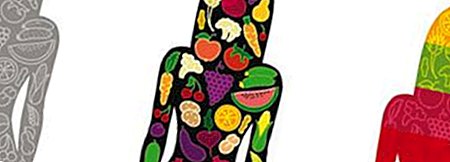Orthorexia: When eating healthy makes you ill

Kate Finn had tried to do everything 100% right. The American yoga teacher committed herself to the raw food movement in order to detoxify her body and get her digestion under control. She only ate fruits and raw vegetables, in between she fasted. The unwanted side effect: it decreased dramatically. Everyone thought they were suffering from anorexia, and her family sent her treatment against her will. "My parents thought I was afraid of getting fat, but my goal was always just health." One day she died of malnutrition.
Kate's fate is rare. But the fact is that more and more people are suffering from "orthorexia nervosa". This eating disorder is back in focus since food trends such as "clean eating", "raw food" and "detoxing" are announced. The term Orthorexie (Greek orthos = right, orexis = appetite) coined the American physician Steven Bratman in his book "Health Food Junkie". Back in 1997, he described a form of eating disorder that results from the obsession of eating only the healthiest of foods.
The desire for control
The obsession with trace elements and vitamins often starts quite harmless - with the very positive desire to eat healthier. But almost imperceptibly, dealing with the sophisticated diet can "be an outlet, especially for people who have little content," says Andreas Schnebel, therapeutic director at the counseling center ANAD eV The transition to an eating disorder is fluid and is often the sufferer not taken at all: you are doing something good. For Sigrid Borse, Managing Director of the Frankfurt Center for Eating Disorders, the causes are in an effort to preserve the ability to act, at least with respect to their own bodies: those affected tried to hedge against the uncontrollable dangers of the world by providing them with their own control system , Who can at least check what he eats, feels less at liberty.
What is healthy, what is harmful?
The confusion is great, because it is becoming increasingly difficult to preserve a relaxed approach to food. Whether omega-3 fatty acids, gluten-free cereals or "superfood" such as algae and chia seeds: Again and again, the food industry comes with new allegedly super-healthy foods and ingredients around the corner. For ortho-doctors absolute no-gos are about sugar, white flour and food with additives. In addition, scandals, the increasingly confusing supply of products, the flood of quality and test seals as well as dubious advertising claims nourish people's distrust. And complicate the food choice in addition.
Orthorectics are so afraid of supposedly harmful foods that they submit to extremely strict dietary rules. They spend a lot of time planning their meals meticulously. All life content is transmitted to the food - as well as anorexic or bulimic. However, the motivations are different: while anorectics want to lose weight, orthorectics want to be clean, healthy and naturally nourished. Accordingly, they feel superior to people who prefer their food to taste and enjoyment.
The way to isolation
"Orthorectics are dramatically limiting their lives, for example, they can never eat pizza with colleagues or friends, they only eat what they have bought and prepared themselves," says Andreas Schnebel of ANAD. The "right" food becomes more important than anything else - love, friends and other interests take a back seat, those affected become isolated, food loses its social function. Steven Bratman, who speaks from his own experience in his book, describes the culmination of his eating disorder: "I did not eat vegetables that were harvested more than 15 minutes ago, I always ate alone in a quiet place, chewed every bite 50 times and listened eating as soon as my stomach was half full, forcing me to raise food that did not contain meat, fat, or artificial ingredients made all social forms of eating impossible. " Later he realized: "I was lonely and obsessed."
If you feel you have orthorexia, it's best to check your situation with the following test, developed by Steven Bratman.










